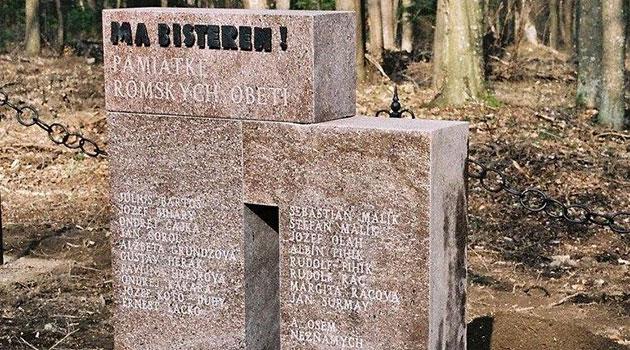This year marks the 76th anniversary of the Nazi murder of Romani people in a detention camp in Slovakia

This year marks the sad anniversary of a tragic event that transpired toward the very end of the Second World War in Dubnica nad Váhom, Slovakia. On 23 February 1945, 26 prisoners in the “Detention Camp for Cikáni” were murdered there.
Given the inhumane conditions that predominated in the camp, an epidemic of spotted typhus broke out there. The Germans took over its management and decided to “solve the problem” in a radical way.
Under the pretext of transporting the sick to hospital, the Germans loaded them into a truck and brought them to the grounds of the local armory, where they brutally murdered them. Of the 26 corpses discovered in the mass grave there, 18 had suffered gunshot wounds, but not all of them were fatal.
Together with the rest of the victims, those people were buried alive beneath shovelfuls of earth and suffocated to death. The victims included 20 men, one of them a boy between the ages of 15 and 16, and six women, one of whom was in the seventh month of pregnancy.
The brother of Mr Ladislav Dudi-Koťa, who was also imprisoned in the detention camp and whose oral history ROMEA has filmed for our “Memory of the Roma” project (Paměť Romů), is extremely likely to have been one of the victims. His testimony is in this video – make sure to turn on the English subtitles.
VIDEO
“At the beginning of the fourth month the Germans came again to bring the sick to hospital, they arrived in a vehicle. They took about eight or nine people, there were women among them, and one of the women said my brother was also ill. He just had a cold, but they took him too. We suspected nothing, we thought they were in hospital. The partisans arrived and the Germans fled, and one of our guys came with the partisans, he was a cop and he recognized us. ‘Girl, the Germans killed your son!’ – ‘What do you mean, they killed him, he’s in hospital, they took him there.’ – ‘No, they killed him, they had dug a pit ahead of time and they put them all in the pit and shot them dead.’ That’s how we found out that my brother was no longer alive,” Mr Dudi-Koťa recounted.
The Detention Camp for Cikáni in Dubnica nad Váhom was established by the Ministry of National Defense of the Slovak State in November 1944 at the site of what had been the ministry’s Department of Operations. It was the only camp of its kind in Slovakia and Romani families from all over the country were sent there.
Soon after it opened the capacity of the camp was exceeded. The hard winter, lack of food, and substandard hygiene conditions left their mark on the prisoners’ state of health.
Eventually an epidemic of spotted typhus broke out there and the camp was put under quarantine. “They didn’t give one enough to get full. Each day you got a piece of bread in the morning, it was military bread [Kommißbrot], a little piece of bread and black coffee. For lunch there was just soup, and for supper, again, a bit of bread and black coffee. We were all very hungry. At Christmas the gadje [non-Roma] who felt sorry for us threw bread and pastries over the fence. We weren’t allowed to go collect that food, though. One little idiot among us took a bit of that bread. The Germans got him and put him under the shower, naked, they turned the cold water on him. We were all afraid to retrieve that food and the bread rotted away there. That poor guy got sick then, he caught cold,” Mr Dudi-Koťa says of conditions in the camp.
After the war ended, the camp was dismantled and no trace of it was left. Today the site of that suffering is marked by a memorial created by the association In Minorita.
Sources:
http://www.romaholocaust.sk
http://www.pametromu.cz
